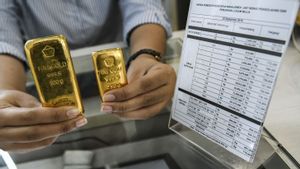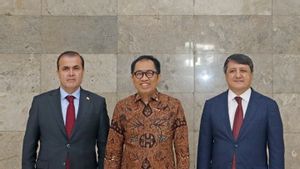JAKARTA - Head of the MSME Community Up Class Raden Tedy said the implementation of tax levies on online trading activities in Indonesia could not be carried out immediately.
According to him, the government must first ensure that the e-commerce industry is the marketplace facilitator tax. Moreover, the domestic financial sector is still in the process of recovering.
"I think those in Indonesia who collect taxes at e-commerce must be ready first. Those who are ready are already large e-commerce workers and surely Umkm must also be ready," he said in a press statement, Thursday, April 13.
Tedy explained, internal research states that there are 42 percent of micro and small business actors who are still recovering.
However, his party hopes that the policy can be implemented in stages, among others, through foreign e-commerce first. This is because tax revenue on online shopping platforms is quite high in line with the increasing transactions.
"In the end, if the platform appointment that has previously implemented the tax collection agent policy in other countries runs smoothly, then local platforms from Indonesia can also imitate and be appointed as tax collector agents," he said.
On the same occasion, UI Tax Professor Haula Rosdiana said that socialization and training were needed for MSMEs to better understand tax regulations.
"They must have tax capability, then the policy is implemented. So I think there must be a kind of preparation program before this is implemented," he said.
Haula added that the government must carry out this policy carefully. The reason is, in taxes there are cuts and collections. Cuts are usually taken from income, while collection from indirect taxes.
There is a possibility that the withoutholding tax scheme will also encourage a shift in economic activity to platforms that are not taxed. This means that although tax compliance will increase, transactions (tax bases) in e-commerce could decrease," he explained.
Haula revealed that the appointment of a marketplace as a tax collector could reduce the level of MSME participation in the digital ecosystem by 26 percent.
For information, the government is currently finalizing the plan to appoint a marketplace as a tax collector agent. The plan to appoint a marketplace as a tax collector agent is an implementation of Article 32A of Law Number 7 of 2021 concerning Harmonization of Tax Regulations (HPP).
This regulation contains a tax withholding policy that allows the government to divert deductions or tax collections from taxpayers by appointing a platform to be a party that can collect VAT on goods sold in the marketplace, and cut PPH on the income of sellers who have the status of Taxable Entrepreneurs (PKP).
The tax-holding scheme has been implemented in several countries and has appointed a marketplace platform as a tax collector for transactions that occur on the platform, or referred to as a marketplace facilitator tax.
The English, Chinese, Japanese, Arabic, and French versions are automatically generated by the AI. So there may still be inaccuracies in translating, please always see Indonesian as our main language. (system supported by DigitalSiber.id)













